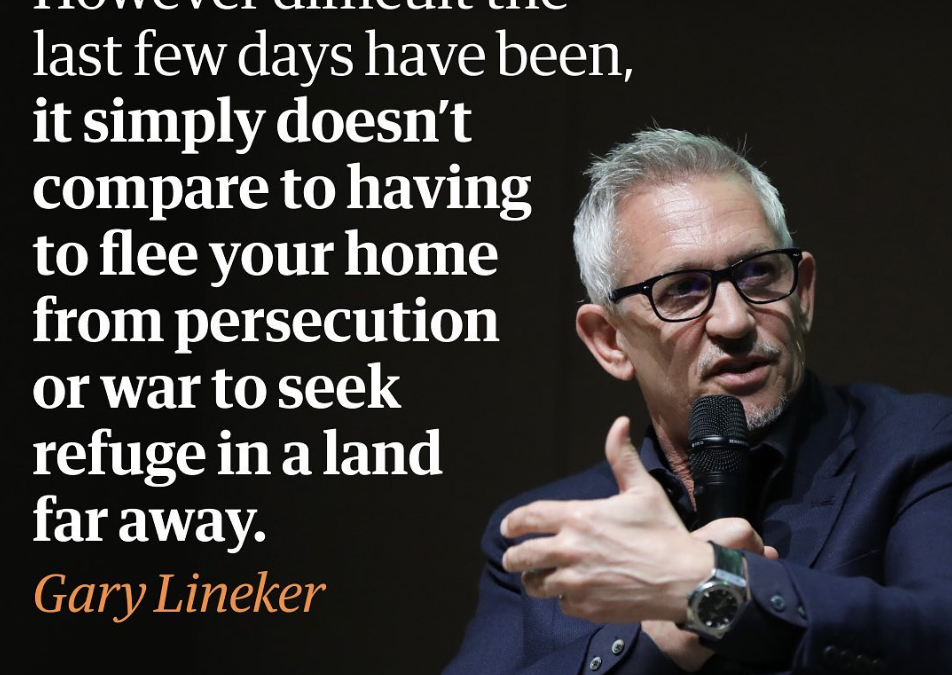Image credit: @Guardian on instagram. @stanleytucci re-grammed this image, writing, “When I grow up I want to be @garylineker.”
The BBC has reinstated former soccer star and “football” commentator Gary Lineker. Last week, the British public broadcaster took Mr. Lineker off the air after a tweet. He accused the Government’s “stop the boats” policy of targeting the most vulnerable. He said it used language reminiscent of Germany in the 1930s. You’ll have seen the stories in the papers. Rather than re-hash those stories, here are four insights on why Mr. Lineker matters. They’re the sorts of observations pundits are less inclined to make in the New York Times. But they’re based on having grown up in England for 25 years before moving to America.
Soccer is Working Class, Which Tends To Lean Right and Racist
My native land is a country where class is seldom discussed, except in hushed tones. It’s also a country where race comes up even less often. But the truth is, soccer, or “football”, is a working class sport. If you’re posh, you play rugby at school. My own school, for example, forbade us from having a football team while I was there. Now, working class English men conform to a few stereotypes. They drive white ford Transit vans. They read tabloids like The Sun or The Daily Mail. They voted for Brexit and they dislike immigrants. There’s a super meme called “day in the life of a true Brexit geezer” that encapsulates the vibe. There’s also harder racism in there. Of course, posh antiracist soccer fans do exist. But nobody would tell you soccer is anti-racist. When Marcus Rashford missed a World Cup penalty, bigots defaced his Manchester mural. And English football is full of examples of similar ugliness.
Lineker Is Using His Platform To Fight Those Stereotypes
Born in working-class Leicester, Mr. Lineker has a broad fan base. For years he was the face of British snack brand, Walker’s Crisps. He was a hero of the Italy 1990 World Cup. He never got a yellow card or a red card. In many ways, he’s a “National Treasure”. So, for him to stand up for principle in an area bound to be contentious for soccer fans represents real courage. To stand his ground despite threats from his BBC paymasters is all the more remarkable. It’s also remarkable that he is calling out the policy of senior British Asians—both Rishi Sunak, the Prime Minister, and Suella Braverman, the Home Secretary. Mr. Sunak has tried to distance himself from the scandal, saying it’s a matter for the BBC. Meanwhile, Ms. Braverman doubled down, accusing Lineker of diminishing the Holocaust. It’s notable that John Barnes, a Black footballer, defended Mr. Lineker. He also drew attention to double standards around race and refugees from Ukraine. What this means is that race is becoming a factor in the British public conversation in a real and public way. That’s new.
It’s Not About Social Media But About Public Figures
The BBC fudged Mr. Lineker’s return to the airwaves by reviewing its social media policy. But the truth is, social media is one channel for airing one’s views. The bigger question is what one sacrifices to become a public figure on the BBC, and those rules are fluid. The solidarity Mr. Lineker’s teammates showed suggests loyalty matters more than such rulebooks. Inspiring loyalty, indeed, is something all Brits can learn from. Particularly its leading politicians.
The BBC Reflects Britain’s Own Corruption
The chair of the BBC, Richard Sharp, was once Rishi Sunak’s boss at Goldman Sachs. He helped arrange a loan for the former prime minister, Boris Johnson. The guy whose government produced a racism study saying Britain isn’t racist. And it’s only a decade since the BBC went through another scandal over one of its most beloved presenters. Post-Covid and post-Brexit, the whole country is going through a reckoning. Many Brits feel demoralized. They’re looking to their leaders to be unselfish and positive. To help them reimagine their country and their identity. The BBC gets public money from a license fee paid by everyone each year. To justify such funding, its leaders will need to rise to the occasion. Rather than sanction him, they could do worse than draw inspiration from Mr. Lineker. He deserves to be Sir Lineker in due course. Although the Royal Family, which bestows such honors, is hardly immune from the conversation about institutional racism. I’m just glad I live in New York, these days, honestly. Too much of the news from my native country makes me feel like we could do so much better, lately.


